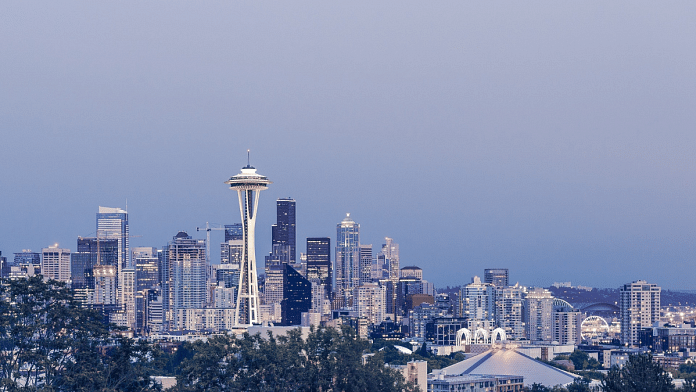New Delhi: Seattle became the first city in the United States to prohibit caste-based discrimination on 22 February, when the city council voted 6-1 to include such protections in existing laws.
Seattle City Council member and a socialist Kshama Sawant, who was one of the principal organisers of the “Occupy Wall Street Movement” in Seattle, introduced the resolution.
Over 167,000 South Asians reside in the state of Washington, primarily in the Greater Seattle area. On one hand, supporters of the ban welcomed the move, while on the other, critics of the new protections argued that they were unnecessary and could lead to a rise in suspicion of people of South Asian descent.
While several South Asians waited in line for hours to share stories of discrimination with council members before the vote, many Hindu-Americans were also of the opinion that the move intends to malign a specific community, Associated Press reported.
What is the ban all about?
The “first in the nation” legislation states that the “it will prohibit businesses from discriminating based on caste with respect to hiring, tenure, promotion, workplace conditions, or wages. It will ban discrimination based on caste in places of public accommodation, such as hotels, public transportation, public restrooms, or retail establishments. The law will also prohibit housing discrimination based on caste in rental housing leases, property sales, and mortgage loans.”
It also pointed to the rise of caste discrimination in the US “across many industries, including technology, construction, restaurants and the service industry, and in domestic work”.
Citing data from civil rights organisation Equality Labs, the bill also highlighted that “one in four caste-oppressed people faced physical and verbal assault, one in three faced education discrimination, and two in three (sixty seven percent) faced workplace discrimination”.
The majority of the discussion in Seattle is centred on the experiences of Dalits in the US. Dalit activists and academics have asserted that such recognition was required in the West, particularly in the United States.
Those who supported the new law stated that it would reduce their exposure to discrimination. Even though Seattle is the first city in the United States to prohibit caste discrimination, such bans are becoming increasingly prevalent in American institutions.
By passing this legislation, the Seattle City Council Democrats joined the National Association for the Advancement of Colored People (NAACP), the Asian Pacific American Labor Alliance (APALA), The American Federation of Labor and Congress of Industrial Organizations (AFL-CIO), the California State University system and Brandeis University in banning caste discrimination.
The law will essentially recognise caste as a basis for discrimination, similar to race or gender. Currently, caste “is not an explicitly protected class”, Real Change News of Seattle reported in an article.
It also stated that in Seattle, caste discrimination “remains a mostly hidden and unreported problem”. The City of Seattle Office of Civil Rights was quoted in the article as saying, “Caste Status is not a recognised protected class in the City of Seattle, and if our office got a complaint about discrimination based only on caste, we wouldn’t be able to look into it.”
Along with Kshama, the ordinance was drafted by Thenmozhi Sounderarajan and Shahira Kaur of Equality Labs, as well as Anil Wagde of the Ambedkar International Center and Maya Kamble of the Ambedkar Association of North America.
After the Seattle City Council approved it, Thenmozhi Soundararajan, executive director of Equality Labs, tweeted: “Love has won over hate as Seattle has become the first in the nation to ban caste discrimination. We have braved rape threats, death threats, disinformation, and bigotry. First Seattle, now the nation!”
Why is the ordinance facing opposition?
Some Hindu American groups have been against the measure. They say that a ban is not needed because US law already forbids this kind of discrimination. In an open letter, the Hindu American Federation (HAF), based in Washington DC, said the ordinance’s goals were good, but that it “unfairly singles out and targets an entire community for different treatment based on their national origin and ancestry”. It also tweeted saying it was a “sad day and that it will single out our community for additional legal scrutiny in the name of preventing discrimination,” MSN reported.
They also said that there were less than 2% Indian Americans in Washington state and that there wasn’t much proof of widespread discrimination based on caste.
HAF head Samir Kalra said, “Seattle has made a dangerous mistake by institutionalising bias against all residents of Indian and South Asian origin, all in the name of stopping bias.”
The Coalition of Hindus of North America tweeted: “More than 100 South Asian organizations, businesses – including Dalit Bahujan groups, temples, cultural associations, and allies – urge @SeattleCouncil to vote NO on @cmkshama’s proposed caste ordinance.”
They further added that the ordinance “is based on falsehoods and unproven allegations by hate groups such as Equality Labs. This ordinance peddles bigotry and singles out the South Asian community by using racist, colonial tropes of ‘caste’.
Similar views were held by Sara Nelson, the lone dissenter in the City Council, who described the legal change as “reckless” and “harmful”, Associated Press reported.
Also read:



